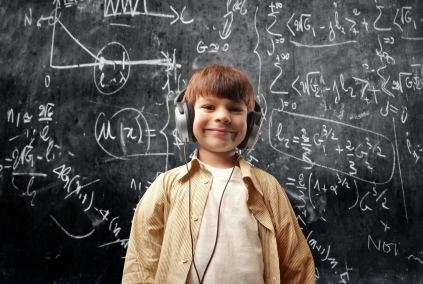With curriculum subjects such as maths, spelling and grammar becoming a major focus of standardized testing in many countries around the world nowadays, it’s easy for schools to become less focused in the arts with some even dropping subjects like music in order to concentrate on achieving higher testing scores. This is an obstacle that many music teachers face everyday in implementing successful music programs. Every day we hear about more music teachers who are facing budget cuts and some who face job loss as a direct result of standardized testing.
As music teachers, we all know that it’s really hard to overstate the importance that music can play in a child’s development. Over the past twenty years researchers from a wide range of science disciplines have looked in extraordinary detail at the impact that music has on our development as humans!
Here are 4 important advocacy research articles and points on music and it’s correlation to high mathematical development you can share with the wider community, school, students and parents:
1. “Music is the daughter of Arithmetic.”
Anonymous, Scholia enchiriadis (c. 900 AD)
Open this document (Microsoft word document) and you’ll find a very interesting synopsis as to how music and mathematics and the sciences evolved alongside each other since the beginning of mankind. Famous early Mathematicians such as Phythagoras and philospher and mathematician Boethius studied music because the study of music was seen as a science very closely related to mathematics and used numbers. There’s an amazing quote written in the article by famous thought leader and philoshopher Roger Bacon (1214) stating that music is essential for all children to learn as the basis of mathematics, grammar and science.
Although this whole article is a heavier read, it’s well worth it and it really puts this quote above into perspective!
2. “The correlation between musical training and maths proficiency may be associated with improved working memory performance and an increased abstract representation of numerical quantities.”
Schmithorst VJ, Holland SK. 2004. “The effect of musical training on the neural correlates of math processing: a functional magnetic resonance imaging study in humans” Neurosci Lett. 2004 Jan 16;354(3):193-6.
This is a research study published in 2004 that took 15 adults ( 7 with musical training from early childhood and 8 without) while they mentally added and subtracted fractions. They found that the adults with prior musical training had the ability to activate more areas of the brain than the non-musical participants (I’m taking out all the big and heavy scientific words here!) . The research concludes that musical training helps to improve math performance. Now obviously there is much more to the research than my very simplified summary, so although it’s heavy going- it’s well worth a read.
3. “Nowhere in the spectrum of arts learning effects on cognitive functioning are impacts more clear than in the rich archives of studies, many very recent, that show connections between music learning or musical experiences and the fundamental cognitive capability called spatial reasoning… In the vast literature on spatial reasoning.. it is clear that mathematical skills as well as language facility benefit directly from spatial reasoning skills.”
“The Impact of Music on Mathematical Achievement”
This has been put together by the team at Kindermusik, but please don’t let that put you off before you start!
It’s put together as a core education article to demonstrate the validity of their early childhood programs, but most of the information is valid for all music educators no matter what age you teach. It’s a simple read, summarizing the connections between music and maths and it’s a great source of information.
4. “One time I was in the recreation hall, late at night, when there weren’t many people, and I picked up a wastebasket and started to beat the back end of it. Some guy from way downstairs came running all the way up and said, “Hey! You play drums!” It turned out he really knew how to play drums, and he taught me how to play bongos.”
Professor Richard Feynman playing the bongos
Theoretical Physicist, Caltech, Nobel Laureat
We’ve all heard of Einstien being a strong advocate of music and this quote comes from another famous scientist who obviously (take a look at this video) shares the love of music. In the video you’ll see Professor Richard Feynman playing the bongos. You would never know from this video that he was actually a nobel prize winning physicist and was ranked as one of the ten great physicists of all time. What many may not know however was that when Feynman wasn’t doing Nobel Prize-worthy research, or inspiring the future physicists of the world, he was known to moonlight as a percussionist. This video shows him in his later years, but look at him really enjoy it! I wonder if he would support music in schools today?



Leave A Comment